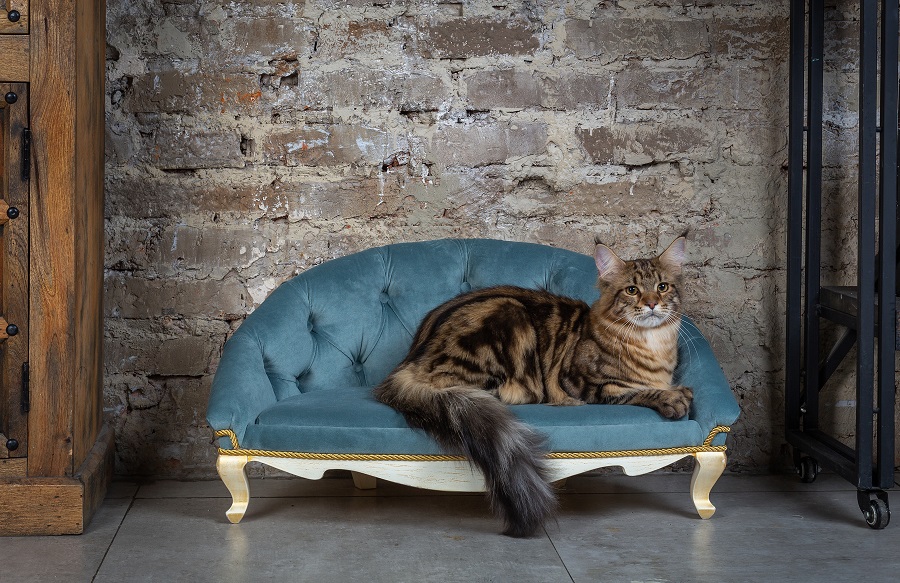 Cystitis in cats
Cystitis in cats
At the beginning of the article I would like to determine what it is. This is an inflammatory disease in the bladder. As a result, the mucous membrane of the latter is damaged and creates four-legged conditions that are extremely unpleasant for a comfortable life.
In the initial stages, the host may not even notice any features in the behavior of the animal. This is the trouble. When the disease begins to worsen, progress, then alarming calls appear.

_120x126.jpg) Symptoms of Cystitis in Cats
Symptoms of Cystitis in Cats
What you should pay attention to, worry and immediately take your pet to the doctor, these are the following symptoms of cystitis in cats:
Frequent "runs" purrs to the tray;
Pain in the bowel movement, which you can determine by the cries of the animal from the toilet;
Blood in the urine;
Often, a pet does not have time to run to his tray. Small puddles appear around the house;
Isolation of pus (in especially advanced cases).
A fair question arises: "How can a pet catch such a terrible ailment?" The most common cause is an infection in the urinary system, as well as hypothermia, followed by a decrease in immunity.
The disease is of two types:
Acute (a sharp deterioration in the state of caudate, a strong manifestation of pain, urge);
Chronic. This type occurs with either complete absence of treatment, or under-treatment. The disease begins to appear periodically with persistent unpleasant symptoms.
_120x102.png) Treatment of cystitis in cats
Treatment of cystitis in cats

As soon as you notice the uncharacteristic behavior of the four-legged, you find similar manifestations in him, consult a doctor immediately! Unfortunately, it will not work. The situation will worsen with each new crisis and lead to complications. So, an infection in the urine can easily begin to rise up and reach the kidneys.
During the diagnosis, your tail will be first of all made the necessary tests. In the urine, an increased number of white blood cells and red blood cells is most likely to be detected. This is evidence of ongoing inflammation. Additionally, it will be proposed to do an ultrasound scan to make sure the localization of inflammation, the possibility of its spread up the body (to the kidneys).
According to the results of a medical study, the veterinarian will select an adequate drug therapy and advise on a diet (if necessary, for the treatment of cystitis in cats). Most often it is recommended to purchase a special feed from the manufacturer Royal Canin Urinary, which is developed taking into account the need for the animal in certain micro and macro elements, as well as limiting the ingredients that provoke the development of stones, exacerbating inflammation.
How to prevent cystitis in cats?
Experts identify a number of factors that can have an effect on the onset and course of the disease:
Urolithiasis disease;
Improper nutrition, resulting in the formation of stones;
Limited amount of fluid consumed by the animal;
Infection;
Stress;
Hypothermia.
_120x127.jpg) Cystitis in dogs
Cystitis in dogs

Not only purrs suffer from a similar ailment. Cystitis is also found in dogs, but it is commonly believed that it is somewhat less common. In general, this is exactly the same disease as cats with the same symptoms and treatment model.
Symptoms of cystitis in dogs also appear quite suddenly, sharply, painfully for a four-legged friend. Firstly, these are frequent urges to urinate, painful, accompanied by whining, barking. In urine, you may find traces of blood.
In order for the disease not to become chronic, treatment should be started immediately. Symptoms of cystitis in dogs cannot be overlooked, and therefore you should not neglect health and take time, hoping that "it will pass by itself."
Treatment of cystitis in dogs will begin with a diagnosis: tests of urine, blood + ultrasound. Then a course of special drugs will also be prescribed, aimed at suppressing discomfort in the dog, as well as combating the cause of the disease (infection).
Cystitis is a very uncomfortable disease. It brings a lot of pain to the pet and greatly affects the quality of his life. Any loving owner will be constantly extremely worried, and therefore it is better not to allow it to occur than to treat it later!
 Select language
Select language 





.jpg)
.jpg)
.jpg)
.png)
